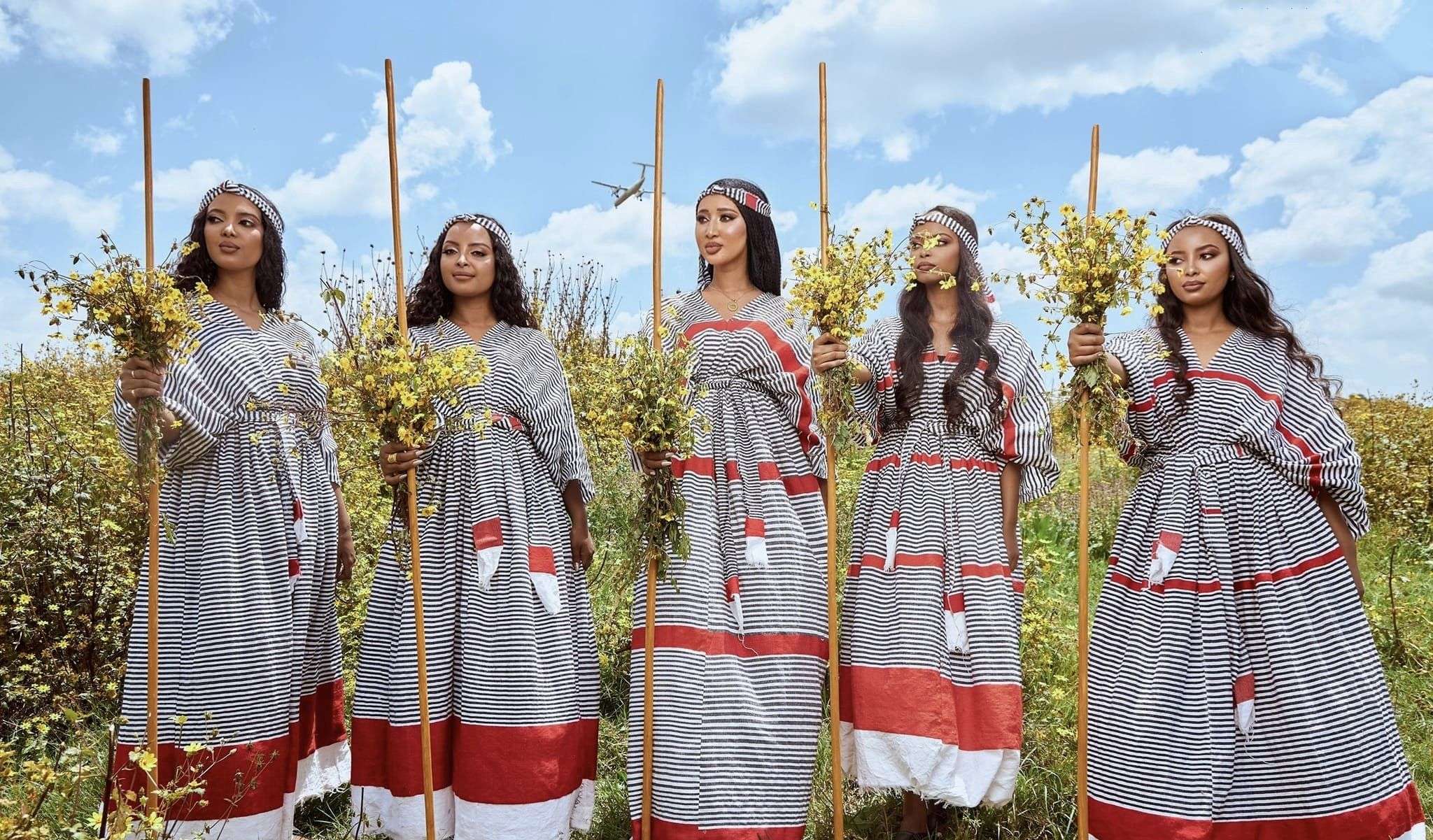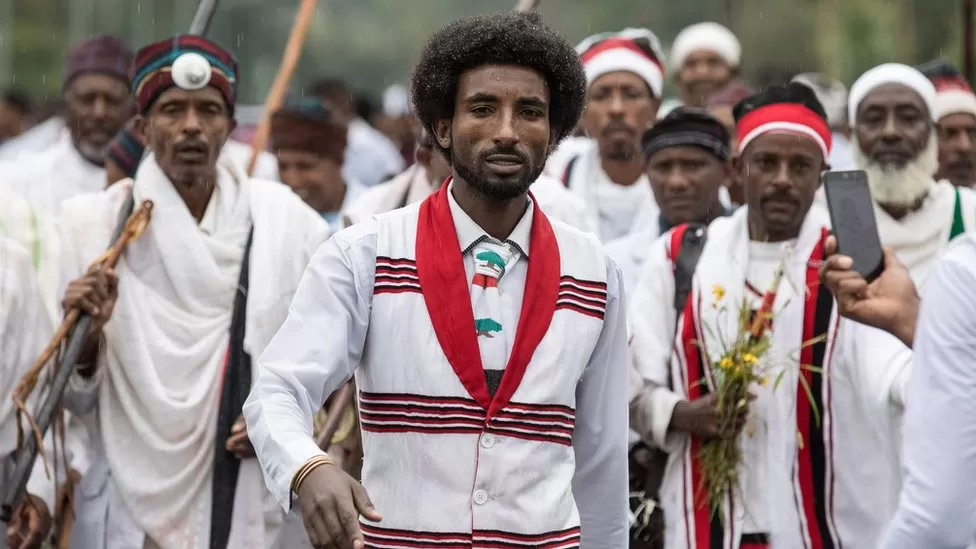Have you ever experienced the sheer joy of being surrounded by a sea of people all coming together to celebrate life? At Irreechaa, Ethiopia’s largest cultural festival, you can. Irreechaa is a magical time when over a million Oromo people converge at the shores of Lake Harsadi to give thanks to Waaqaa, the creator, and ask for blessings in the year ahead.
Irreechaa: An Ancient Oromo Tradition Honoring Nature and Spirituality
Irreechaa is an ancient Oromo tradition honoring Waaqaa, the creator, and celebrating nature and spirituality. For centuries, Oromos have gathered beside sacred lakes and rivers to express gratitude for Waaqaa’s blessings and ask for continued protection.
A Rich Tapestry of Song, Dance and Color
The modern Irreechaa festival is a vibrant display of Oromo cultural traditions. As thousands congregate, the air swells with the sound of ululating women, chanting melees (priests), and singing choirs. Men perform the shoulder dance, jumping and swaying, as women glide and spin. Friends and family greet each other, embracing and kissing cheeks, garbed in traditional Oromo dress – the women in colorful diric skirts and beaded gele headwraps, the men in baggy pants and patterned shamma shawls.
Honoring Ancestral Traditions of Environmental Stewardship
At its heart, Irreechaa celebrates the Oromo connection to land and water. Prayers are offered for rain, fertility and an abundant harvest. Branches of the irreechaa plant, native olive trees and flowers are placed in water to symbolize renewal and growth. Through rituals like daballe, elders use green grass to sprinkle water over participants, blessing them and symbolizing the coming of rain. These acts highlight the Oromo philosophy of caring for nature and understanding humanity’s dependence upon it.
A Beacon of Unity and Shared Identity
Irreechaa transcends religious and political divides, bringing together Oromos of all faiths and affiliations. During the festival, the Oromo feel a strong sense of shared identity and purpose. Irreechaa serves as a reminder of the beauty in Oromo traditions and values, igniting a flame of cultural pride in the hearts of all who attend.
The Significance and Symbolism Behind Irreechaa Rituals
When you attend Irreechaa, the significance and meaning behind the rituals become clear. This celebration is deeply symbolic, honoring nature, spirituality and bringing people together.
The focal point of Irreechaa is the sacred lakes, like Hora Arsadi and Lake Bishoftu, where the ceremonies are held. These serene bodies of water represent fertility and renewal. Offerings of grass, flowers and tree branches are made to Waaqaa, the Oromo monotheistic God, with prayers for peace and prosperity.
- The colorful chamasho grass tied around attendees’ wrists symbolizes growth and new beginnings. The green hue is a metaphor for renewal and fertility.
- The eddaa, a decorated stick given as a blessing, provides spiritual protection. Elders gently tap participants on the head and shoulders, imparting wisdom and good fortune.
Irreechaa reinforces cultural traditions passed down through generations while bringing Oromos of all faiths, ages and backgrounds together in celebration. It’s a unifying event promoting harmony between people and nature.
Whether you’re Oromo or not, Irreechaa is an opportunity to embrace spiritual connections, gain insight into an ancient culture, and find common ground with others. By participating in the rituals, you’ll get a glimpse into the Oromo worldview – one of unity, renewal and peace. A worldview we could all benefit from.
Celebrating Irreechaa in Addis Ababa and Oromia Region
Irreechaa is celebrated in Addis Ababa, the capital city, as well as throughout Oromia region. In Addis Ababa, festivities are held at the national stadium and bring together people from all over Ethiopia. The celebration in Bishoftu town, about 45 kilometers southeast of Addis Ababa, is the largest. Hundreds of thousands of people gather each year at Lake Hora Arsedi, a crater lake that locals consider sacred.

Preparing for the Festival
Days before Irreechaa, people start to gather around the lake to prepare. Women gather firewood and cook meals over open fires to feed the crowds. Men construct makeshift huts and fences from tree branches to provide shelter. Youth gather flowers and grasses to decorate the area. The day before the festival, elders lead a procession around the lake to bless the water and ground.
Celebrating Culture and Faith
On the day of Irreechaa, crowds gather before sunrise. People wear traditional Oromo clothing in a rainbow of colors. Men wear wrapped skirts called ulee and carry walking sticks; women wear colorful dresses called habesha kemis. At dawn, elders say prayers to Waaqaa (God) to give thanks for the rainy season that has ended and ask for blessings for the harvest season ahead. People sing spiritual songs called geerarsa and recite ancient poems.
Giving Thanks
A central part of Irreechaa is giving thanks for water. People carry green grasses and flowers that they throw into Lake Hora Arsedi while singing spiritual songs. Some people enter the lake to pray while standing in the sacred waters. The lake becomes filled with a floating carpet of greenery, creating a stunning visual scene. This act of adorning the lake honors Waaqaa for providing life-sustaining water.
Irreechaa celebrates nature, spirituality, and cultural unity. Attending the festival is a joyful way to experience the cultural heritage of Ethiopia’s largest ethnic group, the Oromo people. By honoring sacred places and giving thanks for life’s blessings together, Irreechaa weaves a tapestry of ancient traditions and cultural renewal.
Planning Your Trip to Experience Irreechaa in Ethiopia
Planning a trip to experience Irreechaa in Ethiopia is a rewarding endeavor, but there are a few key things to keep in mind. Irreechaa typically takes place in early October, during Ethiopia’s rainy season. The festival date varies each year based on the Ethiopian calendar, so check online for the exact date.
Traveling to Bishoftu
The festival is held in Bishoftu, a town about 45 kilometers southeast of Addis Ababa. The easiest way to get there is to hire a driver for the day to take you from Addis Ababa to Bishoftu. Alternatively, you can take public transport – a bus from Addis Ababa to Bishoftu leaves every 30 minutes and takes about an hour.
Finding Accommodation
If you want to stay overnight in Bishoftu, book lodging well in advance, especially for the night before and after the festival. Hotels fill up quickly, so you may need to look at options in nearby towns like Modjo or Adama. Camping on site is also very popular, with many Oromo families camping for days leading up to and following the festival.
Dressing for the Occasion
Irreechaa has a casual, comfortable vibe, but you’ll want to dress conservatively out of respect for the sacred nature of the event. For women, a long skirt and loose top or traditional habesha kemis is ideal. For men, slacks and a button-down shirt is recommended. Don’t forget comfortable walking shoes, a rain jacket, sun protection, and a hat.

Experiencing the Festival
The focal point of Irreechaa is Lake Hora Arsedi, where attendees gather to sing, dance, and give thanks around the lake’s shore. Oromo cultural groups perform traditional dances and songs on stage throughout the day. You’ll witness spiritual rituals like daballe, where elders rhythmically chant and sway branches. Most importantly, chat with attendees, share a coffee ceremony, and make new friends. Irreechaa is meant to bring people together, so immerse yourself in the community and culture.
By following these tips, you’ll be fully prepared to experience the magic and splendor of Irreechaa. Enjoy this special opportunity to gain insight into Ethiopia’s largest ethnic group and celebrate nature, spirituality and cultural unity with the Oromo people.
Frequently Asked Questions About Attending Irreechaa
So you’ve decided to experience the magic of Irreechaa firsthand. That’s wonderful! However, before heading to Hora Harsadii, the site of the annual celebration, there are a few things you should know.
What should I wear?
Dress conservatively and comfortably. As a sign of respect, men and women typically wear traditional Oromo clothing like the dhukkuba and habesha kemis. However, if you don’t have traditional attire, modest casual clothing, like slacks and a button-down shirt for men and a long skirt and blouse for women, is perfectly acceptable.
What’s the schedule of events?
The celebration spans over a week, but the biggest events happen on the last Sunday, called ‘Irreechaa Malkaa’. People start gathering at Hora Harsadii in the early morning. The day begins with rituals like daballee (the building of bonfires) and dhiimmeessaa (the making and giving of blessings). There are speeches, cultural performances, and religious ceremonies. The afternoon features the most well-known events like dargiin (blessing of the water) and dhiifama mootii (jumping over the canal).
What should I bring?
Definitely bring a camera to capture the vibrant cultural displays. Pack essentials like sunglasses, sunscreen, a hat, and wet wipes. Bring enough bottled water and snacks to last the entire day. While some vendors sell food and drinks, options are limited. It’s also a good idea to pack rain ponchos, as the fall rainy season brings afternoon showers. Most importantly, bring an open and curious mind to fully embrace this special glimpse into the Oromo way of life.
Is it safe for foreign visitors?
Yes, Irreechaa is very welcoming to foreigners. However, exercise caution as with any large gathering. Be aware of your belongings, don’t display valuables, and avoid being alone. The crowds can get quite dense, especially around the canal, so be prepared for close contact with many people. If at any point you feel unsafe or overwhelmed, don’t hesitate to notify local authorities. They are there to ensure all attendees have an enjoyable and meaningful experience at Irreechaa.
Conclusion
So there you have it, a glimpse into the magic and wonder of Irreechaa. This unique cultural festival is truly a celebration of life, community, and spiritual connection with nature that stays with you long after the crowds have dispersed and the flowers have faded. Make the journey to experience Irreechaa for yourself – dance, sing, reflect and renew your connection to what really matters. The infectious joy and warmth of the Oromo people will fill your soul and the striking beauty of the landscape will nourish your spirit. Return home with memories of a cultural tapestry as vibrant and colorful as the flowers gently floating down the river. Irreechaa – an ancient celebration and a lasting invitation to embrace all that unites us.
